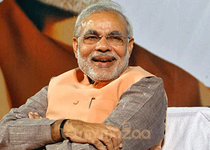For the past two weeks, the top civil servants in India's labyrinthine bureaucracy have been sent back to school.
Graduate degrees are commonplace in this crowd. Plenty have diplomas from Oxford, Cambridge or Harvard, and most were raised speaking English — the language used in most official documents and correspondence in India.
But these days, they are spending their evenings frantically looking up words after new Prime Minister Narendra Modi declared that all official documents must be written in Hindi, spoken by hundreds of millions across northern India. While many bureaucrats speak the language, few know the formal phrases needed for official communication.
"It's unbelievable how much time I spend rifling through the Hindi dictionary," said a senior official, who asked not to be named for fear being seen as criticizing the new government. "A simple letter now takes me ages."
Modi's campaign promises included a vow to crack the whip on Delhi's gargantuan and slow-moving bureaucracy, but the language shift is also clearly part of an outsider's attempt to etch his own imprint on the political culture of the Indian capital.
Many of Modi's early decisions have sent ripples of unease through the ranks of India's powerful civil servants, threatening to upend this city's long-established pecking order.
Another early signal came within days of Modi's inauguration, when Indian news outlets reported that the government had asked for a list of bureaucrats who belonged to New Delhi's golf clubs.
"The report that such a list was being drawn up gave many of us the jitters," said another official, an avid golfer, who also requested anonymity. "The implication was that if you are a regular on the golf course, then work may not be your first priority."
The recent election brought seismic political changes to the capital, with the overwhelming majority gained by Modi's Bharatiya Janata Party all but wiping away the nearly six decades of dominance by the Congress party — traditionally dominated by those who spoke English at home — which had shaped Delhi's bureaucratic landscape.
"Delhi's drawing room set, especially top government officials, are deeply suspicious of this new lot of power-wielders with whom they have little in common, let alone language," said Abhilasha Kumari, a New Delhi-based sociologist.
At his first meeting with the capital's top officials, Modi laid down new ground rules: Reduce delays, cut red tape and ensure greater accountability and efficiency. Other edicts: swift disposal of files, holding officials responsible for delays in decision-making, and limiting cushy post-retirement jobs for civil servants.
India's civil service, a collection of state and national agencies that totals some 6.5 million people, was the proud "steel frame" that helped govern the vast subcontinent during British colonial rule. Families here dream of their children passing the rigorous entry examinations to join the exclusive ranks of civil servants.
These days, though, it's also widely derided as a contributing factor in the country's sluggish economic growth, with widespread corruption and lack of expertise often masked by tedious rules and sheer inefficiency.
Modi made streamlining the bureaucracy a campaign platform, vowing "maximum governance and minimum government."
He also said he wanted to restore a sense of pride to India's dejected millions, many of them battling unemployment and grinding poverty. One quick boost would be giving prominence to Hindi, the language of the masses.
So a day after the new government took office, India's home ministry ordered officials to switch to Hindi on social media. Modi also ordered officials to use Hindi in all official correspondence and to take notes in Hindi. Modi himself declared he would only speak Hindi with foreign leaders.
The changes have shaken the government's power managers.
The newly elected lawmakers "speak a different language and are socially conservative in their outlook," Kumari said. "Certainly, there is a sense of disquiet among the bureaucrats," she said.
Modi could not be further removed from Delhi's reigning English-speaking caucus.
The son of a poor tea-seller, he rose to become the longtime chief minister of his native Gujarat state in western India. His patchy education was mostly in Hindi and Gujarati, and he earned his university degrees through correspondence courses.
But language is also politics for Modi, who spent years as a preacher with the Rashtriya Swayamsewak Sangh, or National Volunteers Association, a powerful Hindu nationalist movement that sees Hindi as the true language of a powerful India.
While Modi rarely speaks English in public, he is said to speak the language fairly well, even if he's not completely at ease.
But in a country with as many as 22 official languages, many question Hindi's dominance.
Although Hindi and its numerous dialects are spoken by about 45 percent of India's 1.2 billion people, there are hundreds of millions in the southern, eastern and remote northeast parts of the country who don't speak Hindi at all. In recent years, as India has joined the globalized economy, English has become increasingly important beyond the urban elite. Today, about 10 percent of the country is thought to be proficient in English.
For the senior civil servants, the sudden language shift is an added burden.
"Most officials think in English. But if they have to translate documents, or write letters in Hindi, it would slow down the process," said Amitabha Pande, a retired civil servant. "In many ways it would be counter to what Modi set out to achieve — speeding up government functioning."







